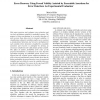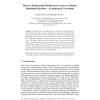1583 search results - page 13 / 317 » Using Multi-context Systems to Engineer Executable Agents |
151
click to vote
ESAW
2003
Springer
15 years 7 months ago
2003
Springer
Abstract. Complexity in software design refers to the difficulty in understanding and manipulating the set of concepts, models and techniques involved in the design process. Agents...
112
click to vote
EUROMICRO
1999
IEEE
15 years 6 months ago
1999
IEEE
This paper proposes and evaluates error detection and recovery mechanisms suitable for embedded systems. The purpose of these mechanisms is to provide detection of and recovery fr...
115
click to vote
APIN
2006
15 years 2 months ago
2006
The Multi-Agent Distributed Goal Satisfaction (MADGS) system facilitates distributed mission planning and execution in complex dynamic environments with a focus on distributed goal...
136
click to vote
JIRS
2000
15 years 2 months ago
2000
Agents (hardware or software) that act autonomously in an environment have to be able to integrate three basic behaviors: planning, execution, and learning. This integration is man...
129
click to vote
ECMDAFA
2007
Springer
15 years 8 months ago
2007
Springer
The paper targets the applicability of model-driven methodologies to the validation of complex systems and presents a case study of a mobile radio network. Validation relies on the...


